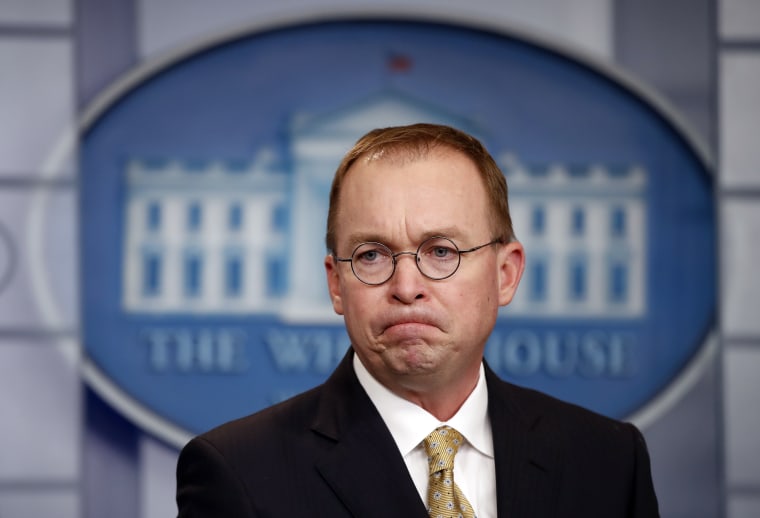It's no secret that Donald Trump's search for a new White House chief of staff wasn't going well. It was also painfully obvious that the president was eager to squelch the chatter that this was a job no one wanted to accept.
The result was an awkward new arrangement announced late Friday afternoon.
Budget director Mick Mulvaney headed to the White House Friday expecting to attend a meeting on federal budget issues, according to a source close to him. Instead, by the end of the day, he would -- at least temporarily -- become President Donald Trump's third chief of staff.Trump, who had been rebuffed by at least two potential replacements to the outgoing chief of staff, Gen. John Kelly, hastily settled on Mulvaney as acting chief after initially refusing vice presidential chief of staff Nick Ayers' request to serve in a similar interim capacity.
It's not like Trump's other impulsive decisions have ever gone poorly, right?
This will be the third powerful post Mulvaney has held on Team Trump over the last 22 months, following a year-long stint as the head of the Consumer Financial Protection Bureau (CFPB).
According to the White House, Mulvaney will be "acting" chief of staff -- a title the former congressman reportedly requested -- and NBC News' report added that Mulvaney intends to serve for no longer than six months.
Complicating matters a bit, Mulvaney will remain the director of the Office of Management and Budget (OMB), at least for now, which creates a dynamic that, at face value, seems difficult to understand: serving as the White House budget director is a full-time job, as is serving as the White House chief of staff.
What's more, with a possible government shutdown on tap for later this week, one is tempted to assume Mulvaney would be awfully busy right now with his principal duties at OMB.
There's plenty of room for speculation about whether Mulvaney can succeed where Reince Priebus and John Kelly fell short -- I tend to think this president's operation is ungovernable, setting up whomever holds the post for failure -- but as the South Carolina Republican prepares to assume control over Trump's White House, there's another angle to his rise that's important to keep in mind:
Mick Mulvaney excels at failing up.
In the not-too-distant past, Mulvaney was a fairly obscure right-wing congressman best known for championing government shutdowns and debt-ceiling crises. As recently as 2016, he even accepted a speaking invitation from the John Birch Society.
Trump saw this as a record worthy of a promotion, elevating Mulvaney to lead OMB, where he peddled conspiracy theories, was at times disconnected from the president's position on budget issues, and where he gave the banking industry some rather crude advice on how best to buy access to policymakers.
During Mulvaney's tenure as budget director, the nation's finances also took a turn toward the absurd: by some measures, the United States has never had a budget deficit this high during a period of strong economic growth.
He also unveiled a budget plan with a jaw-dropping $2-trillion mistake – and then insisted his colossal screw-up was intentional.
It's against this backdrop that Trump decided to give Mulvaney additional responsibilities, so the president tapped him to lead the CFPB -- despite (or perhaps, because of) the fact that Mulvaney opposes the existence of the CFPB. Predictably, he proceeded to gut the agency's enforcement efforts, aligning the bureau's priorities with the goals of the payday-lending industry.
And yet, the more Mulvaney's record took ridiculous turns, the more the president was impressed. Every failure has been followed by a promotion.
Looking ahead to the next six months, I'd recommend keeping expectations low.
Postscript: Ron Klain, who's served as chief of staff to Al Gore and Joe Biden, noted over the weekend that because Mulvaney will remain the nation's budget director, Trump has chosen the first-ever White House chief of staff who can be called to testify under oath before Congress.
I wonder if the president thought about this before offering Mulvaney the job.
